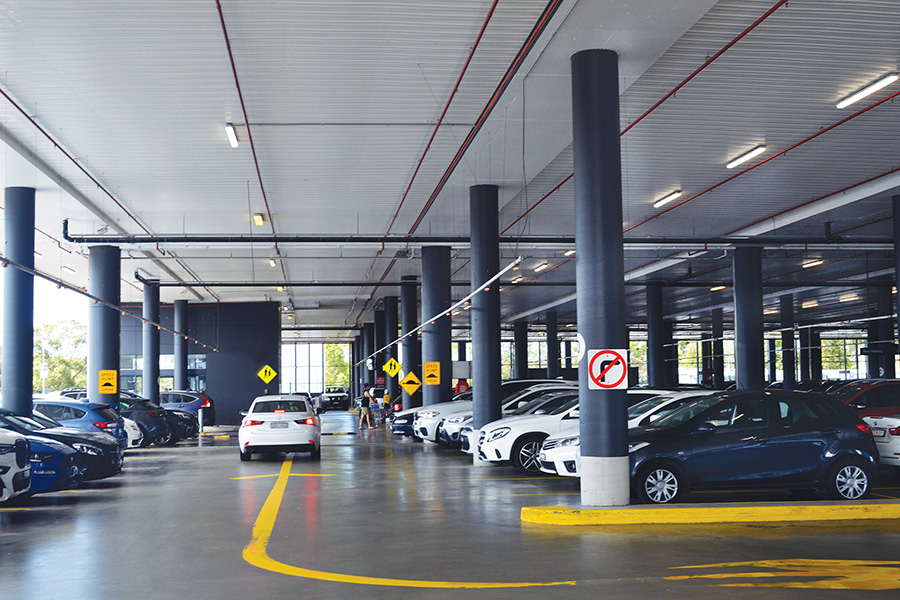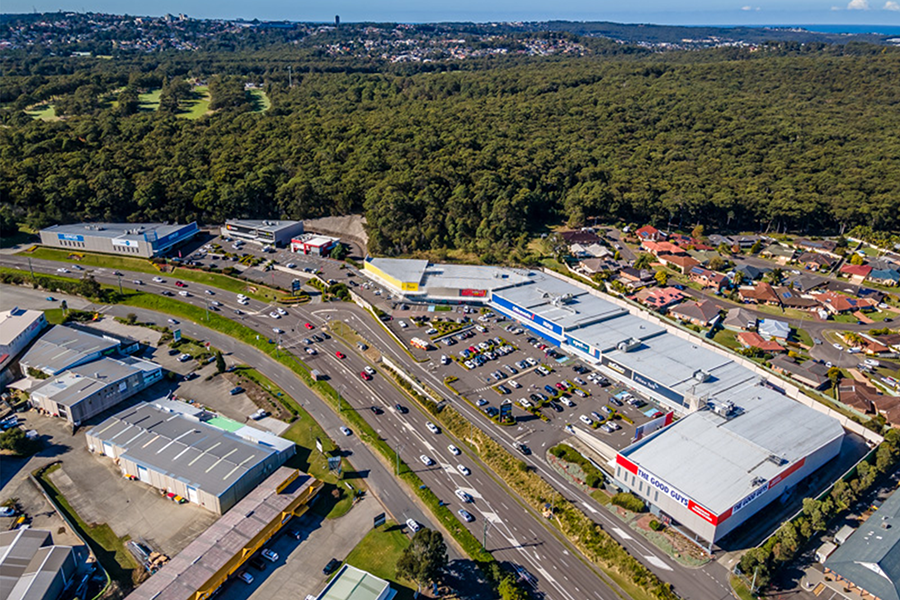Ask anyone in our industry – from the first-year executive to the CEO, “Why do shopping centres charge for parking after a certain free period?” You’ll get only one answer: “To make sure those parking there are shoppers, as distinct from non-shoppers – perhaps commuters or even those going to other places near the centre.” Yes, it’s obvious; we want our carparks for shoppers; that’s why we build them; that’s why authorities demand them and that’s what the public want them for. Without doubt, it’s obvious to the South Australian government, but they have other agendas that have nothing to do with fairness or proper and practical management.
This article by Angus Nardi, Executive Director, Shopping Centre Council of Australia (SCCA) was first published in SCN Vol. 40 No. 3 (July/August edition).

A few years ago, SCN published an article in relation to how shopping centre car parks had become a hot political issue, again.
Well, history is repeating itself, again. At the time, it was in WA (and before that, Queensland). This time around, South Australia is ground zero.
Before the recent SA election, the newly elected Labor government made a ‘100-day’ election commitment to prohibit paid parking at Westfield Tea Tree Plaza.
On the 100th day after the election, at a press conference fronted by the Premier (the Hon Peter Malinauskas), the new government announced its intent to table a Bill into Parliament, which they have since done.
We thought this was about to occur as an amendment to the Private Parking Areas Act that had appeared in the Parliamentary Notice Paper.
It’s hard to tell the complete picture from the media coverage, but the press conference was attended by the relevant Minister, a local MP, a local council representative and a union representative from the Shop Assistants’ Union (SDA).
The media coverage may not have gone entirely to the government’s plan, given that a headline in the Adelaide Advertiser the following day read: ‘Populist Pete cops whack on car parks’.
The Adelaide Advertiser noted in another article: “At its core, this was a policy designed to shore up votes in the must-win seats of the northeastern suburbs when Labor was in opposition and had its sights on the March election”.
Further: “Plans to start charging for parking were never going to be popular, but the case put forward by Westfield was not unreasonable. Their data shows more than a third of carpark spaces are not being used by customers. Commuters and workers at other facilities are using the carpark because others in the area are already charging fees or are too small.”
The critical response to the announcement was not unexpected.
This is because the election commitment and ‘mandate’ is based on a bunch of nonsense, reflecting a flimsy and one-dimensional policy basis accompanied by a populist and manufactured political campaign and narrative.
The policy, which seems to have the key intent of guaranteeing free parking for retail workers, fails to consider a wide range of policy and operational issues that would and should normally be considered (which I will get to below).
First, the policy relies heavily on a variety of false claims in relation to the introduction of managed parking at Westfield Tea Tree Plaza, and managed parking in general. This includes the false branding of the issue as being ‘paid parking’, ignoring the free parking period that 99% of customers experience.
Further, there was a claim that retail staff would be paying (and hence the Government will ‘save’ these workers) $35 per day or $9,000 per annum. This claim is false.
Not a shred of evidence has been provided to back up this claim.
A further false claim is that the policy will be good for retailers and customers by guaranteeing ‘free parking’. Nothing could be further from the truth, and the National Retail Association (NRA) – the key national industry group that represents retailers – has rejected this claim. If the Bill is passed, it would enable a free-for-all for commuters, nearby businesses and others (eg. hospitals) – i.e. people that aren’t customers – to clog up shopping centre car parks at the expense of retailers and customers.
Further, the Bill goes beyond the ‘election commitment’ and applies to a broader range of shopping centres above an arbitrary threshold of 34,000m2 (Armada Arndale shopping centre is the ‘smallest’ centre captured by the Bill). This threshold or broader application – notwithstanding the flimsiness of the policy – was not flagged before the election.
Overall, the policy and associated narrative sadly seems like a contrived political agenda against ‘big business’, given that language such as ‘multi-nationals’ and needing a ‘social licence to operate’ has been used against us.
As part of the announcement, the Government and SDA used the language that shopping centres were ‘fleecing’ (yes, fleecing) their customers. This language and claim are just plain wrong.
Like previous occasions, the policy seems to be in response to a campaign initiated by the SDA. In the current case, this campaign was in response to the lodgement of a DA in early 2021 for parking infrastructure at the centre.
To be clear, like on previous occasions across the country, the proposal was for a lawful land-use, a lawful activity and was to enable the effective management of the car park, including in response to non-customers using and clogging up the car park.
The introduction of managed parking is also entirely consistent with a variety of government planning, transport and sustainability policies – many of which were introduced by the former SA Labor Government.
I have written in SCN previously that the SDA has, for some time, wanted “free and safe parking for retail and fast food workers”.
I’ve also flagged previously that the SDA should pursue the employers (eg. Woolworths) of these workers for this outcome, via their industrial agreements, versus shopping centres whom neither employ or have a direct relationship with such workers.
In the current case of SA, it’s disappointing that it didn’t take long for the SDA to forget that we responded directly to their request for support to provide space for COVID-19 vaccination pop-ups late last year to enable retail workers to more readily access vaccinations. Our industry did this for free, working with SA Health (who have acknowledged our support).
I raise this as I thought it would be reasonable to expect a little good faith from the SDA rather than simply pouring populist disdain on us.
In terms of the government, it’s my view that they simply don’t ‘get it’.
The responsible Minister has been reported as saying that the Bill “will save workers and shoppers in the north-east thousands of dollars a year and (could defeat) a move that would have driven consumers away from the centre, hurting many of its small business operators”.
The claim that managed parking would ‘drive away consumers’ has absolutely no logical basis to it, particularly given managed parking is designed to prevent non-users from taking up precious spots all day; preventing actual customers from using them.
The claim that it would hurt small business operators highlights just how little the government understands shopping centres, retail and car parks.
In my experience, the more the huffing, puffing and big talk, the flimsier the policy basis is. Facts and logic are replaced with false claims. Sensible discussion is replaced with cheap slogans and accusations. Analysis is substituted with hot air.
Since the government tabled the Bill into Parliament, we have written to the Opposition and cross-bench, such as SA Best and The Greens to present them with some key facts and to seek urgent discussions.
Pleasingly, as I noted above, defying the claims of the government that the Bill will help small businesses, Dominique Lamb, the CEO of the NRA has called for the Bill to be rejected as it will harm retailers and their customers.
We welcome the NRA weighing in on this issue, which it has supported for some time, including opposing the SDA’s application back in the early 2010s to the Fair Work Commission to amend the Modern Award (Retail) to provide that, if a retail worker chooses to park at a car park that requires payment, they should be compensated.
We worked with the NRA to oppose that application, and the SDA’s application was ultimately unsuccessful.
Some of the key points we’ve made to the opposition and cross-bench are as follows:
Firstly, while the government’s election commitment was limited to Westfield Tea Tree Plaza, their post-election announcement included that the Bill will apply to shopping centres with 34,000m2 or more retail floor space (thus capturing eight centres in total). The government does not have an election mandate for the broader industry. Further, the 34,000m2 threshold is arbitrary.
Secondly, as noted above, the claims which seem to underpin the Government’s policy are false and that these claims have been clarified by our industry (yet the Government still seems to be running with these false claims).
Thirdly, it overrides the fact that car parks are there for customers. They are not there for non-users of the centre, including commuters or workers or visitors of nearby facilities. Customers are the lifeblood of shopping centres.
Fourthly, prohibiting paid parking is inconsistent with government policies including policies made under the previous Labor Government. This includes a raft of planning, transport
and sustainability policies. What is the point of these policies if the government simply undermines them?
Fifth, it reveals incredibly bad faith from the government in circumstances where shopping centres have public transport facilities on their land, often at incredibly favourable commercial terms. In essence, our support for working with governments to support public transport objectives has been turned on its head given we will be unable to manage the pressures arising from such facilities, including commuters parking at the centre.
Sixth, the Bill will not benefit retailers or customers, as the government claims. In fact, the Bill will lead to poor outcomes for retailers and customers. The government does not understand the function of car parks including to ensure they are turned over several times a day to facilitate access and convenience for customers.
Seventh, the policy highlights hypocrisy given that it only applies to shopping centres and no other type of land use or activity, meaning that others can still introduce managed parking and charge for parking (eg. office buildings, the CBD, hospitals and airports).
Eighth, the Bill is contrary to our obligations under retail lease legislation, whereby we are required to disclose to prospective tenants how many parking spaces are available for the use of customers. In effect, the SA Parliament has previously determined that shopping centre car parks being available for the customers of retailers is a critical issue.
It is incredibly frustrating that our industry, and SCCA members, appear to be the victims of populist politics and a targeted political campaign that seems shallow, contrived and unfair. We’re always happy to debate the merits of issues, but the government has instead gone for the easy option of false claims and slogans.
The government has even put to us that ‘the community doesn’t want paid parking’, to which we have said the community don’t want to pay tax either if you ask them. This is how silly this issue has become. This is also from a government that charges people for public transport, along with charging people to park at hospitals.
This Bill sends a terrible message that we cannot use our land or property for a lawful purpose, including for a purpose that others will continue to be able to use their land for.
We are having our legal and property rights taken away, including to the detriment of retailers and customers. We are unable to properly manage the pressures on our land due to external forces and matters beyond our control.
And all of this because of a campaign and policy based on false claims. This is no doubt why the Premier was referred to as ‘Populist Pete’ in the media article.
We ultimately don’t want to be in a battle with the government on this issue, and we truly hope that they will add a bit more depth to their thinking and see reason.
The government ultimately requires only a couple of votes in the upper house to secure support for the Bill, which will be debated in September following the Winter recess.
We have urged those who can determine the fate of the Bill to reject it in full, or if its passage is supported we have raised several detailed amendments.





















